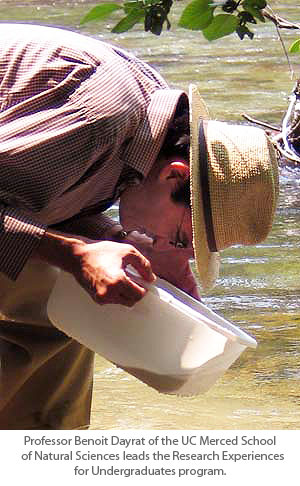

Professor Benoit Dayratof the UC Merced
School of Natural Sciencesleads the
Research Experiences for Undergraduates(REU) program. This summer he divides his teaching time between Yosemite National Park and his
research labon campus, a prospect that, although daunting, is exciting.
“It’s very busy, and a lot of work,” he said enthusiastically. “The opportunity for undergraduates to do research in Yosemite is unique. It is very special really, and I am delighted to give this opportunity to the students.”
Funded by the National Science Foundation (NSF), the REU program kicked off its first session June 16 with eight students who are housed in the newly renovated
Wawona Field Stationfacilities and have been assigned specific research projects within the park.
Dayrat oversees student-conducted REU projects that focus on learning more about the unique ecologies and environments within Yosemite National Park, our impact on them, and the potential to manage or minimize said impact in the future. Dayrat designed two of the research projects, one to investigate
gall waspspecialization in the Central Sierra Nevada region, and the other to tackle environmental DNA barcoding of Yosemite freshwater macroinvertebrates.
The professor, whose focus in the lab at UC Merced is on the biodiversity and evolution of mollusks and gastropods (snails and slugs), embraces the chance to branch out.
“It is an opportunity for me, too. It gives me a chance to start new
researchthat I have always wanted to work on but have not had the time for.”
Dayrat spent the first few weeks teaching the correct procedures for collecting samples and recording data, climbing and hiking alongside the REU students as he trained them in one of the most beautiful parks in the world.
But he will withdraw to UC Merced eventually. “It is very important to teach them to be independent,” he said.
However, he will return regularly to check on their progress and to conduct “Science Friday” seminars with Wawona Field Station Director
Eric Berlow.
During the Science Friday, seminars he and Berlow will lead REU and
Yosemite Leadership Partnershipstudents, who will live at the field station, through the history and process of scientific inquiry, its role in natural resource managements, and the communication of science to the public.
This is all right up Dayrat’s alley; in his lab at UC Merced he leads his students as they research the history and philosophy of science, and the history of the discovery of biodiversity, often with an eye for challenging existing methods and materials.
Although he will travel between the park and campus, he will be fully engaged in work that excites him in both locations; an enviable position for any professional to be in.
“I will be available should they need me, but I have students with ongoing research in my lab,” he says of the work that pulls him back to campus, “I have to pay attention to them as well.”






